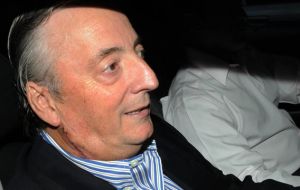MercoPress. South Atlantic News Agency
Long live the strong man for he faces three major challenges
 Nestor Kirchner talks with reporters as he leaves the hospital
Nestor Kirchner talks with reporters as he leaves the hospital Former Argentine President Nestor Kirchner left the hospital three days after emergency surgery on an carotid artery that feeds blood to his brain, which was described by the medical staff as “serious and intervened on time”.
News broadcasts showed Kirchner being driven away from the hospital Wednesday morning in Buenos Aires. He rolled down the car window to tell reporters he felt “very good, 100 percent.”
Doctors operated Sunday after Kirchner had trouble moving his upper left arm, a symptom of problems in one of his carotid arteries.
Kirchner was president from 2003 until he was succeeded by his wife, Cristina Fernandez de Kirchner in 2007. He is currently a Deputy in the lower house of congress and is expected to run for the presidency again in 2011.
President Cristina Fernández de Kirchner had dinner with her husband Tuesday night after saying on a public speech that no one had to worry about the ex president as there was Néstor Kirchner “for the long run”, and then added, “my husband is in a very good state of health, and his evolution is positive.”
However Mr. Kirchner’s quick recovery and his wife’s “long life” forecast have several challenges ahead which could derail the couple’s plans for the future according to political analyst Joaquin Morales Solá, considered the most respected of his trade in the Buenos Aires media.
The strong man of the seven-year K primacy is facing, according to Morales Solá, party indiscipline, a new Congress where the Kirchners do not have a working majority and even more pressing the need to ensure they can get their hands on the Central Bank reserves to keep their political “subsidies and compensations” scheme working.
But Morales Solá has trimmed the situation to three main challenges: the evident deterioration of Mr. Kirchner’s image following the disclosure he had purchased two million US dollars, --for the acquisition of a hotel from a close businessman in El Calafate--, in the midst of the September/October 2008 global financial crisis that sent shivers all over the world.
Both legal operations but not the moment and much less a former president operating those sums of money: this evidently tarnishes his image and his 2011 chances, if he had any to succeed his wife in the Casa Rosada.
Secondly, equally significant in Argentine politics and in the hegemonic Peronist party: former Senator and governor of Santa Fe and a good friend of farmers Carlos Reutemann has given again evidence that he has the capacity, persuasion and respect to reunify and reorganize the dispersed government alliance, precisely divided because of the confrontation style of the Kirchners.
His recent scathing remark, the people of Argentina can feel pleased if by the time they leave in 2011 “they haven’t stolen Government House and Plaza de Mayo” had a resounding public opinion feedback and all grass-root leaders took notice.
Knowing he has few flanks, the Kirchners have been very careful in never attacking Reutemann who has always been considered a “reserve” man for the Peronist movement. In any case it was the job of second rank “Kirchnerites” to reply his words that still echo in Argentina.
Finally is the issue of inflation which the government denies, then tepidly admits for some staples blaming the farmers but which affects all consumers. Officially the Kirchner inflation is just below two digits, but independent provincial statistics offices and private economic advisor offices show it’s at least twice that percentage, and increasing.
Furthermore even the strong trade union movement under the leadership of the teamsters boss Hugo Moyano and a close ally of the Kirchners, brushes aside the official inflation and is demanding 20% salary increase for the next round of negotiations.
To make things even more complicated, President Cristina Kirchner who has discovered her passion for public speeches lecturing on the many subjects she presumes to dominate, to underline the strong economic situation of Argentina had sarcastic almost burlesque references to country members of the UK press creativity: PIGS, Portugal, Ireland, Greece and Spain.
Morales Solá points out that it is most unfriendly and rude for a President to publicly refer to other countries in the terms of the UK media imagery, particularly for example in the case of Spain, which has been so patient and generous, both King Juan Carlos and president Rodriguez Zapatero towards the Kirchners and Argentina.
The analyst finally recalls that only in the defunct Soviet Union it was possible to announce publicly that the leader or strong man was healthier and in much better conditions following a serious emergency surgery as experienced by Mr. Kirchner.
Therefore the events of this week must be read looking for the opposite message: Mr. Kirchner is in for a long, quite convalescence while the Argentine economy is ever more exposed to an escalating inflationary process and budget shortfalls.




Top Comments
Disclaimer & comment rulesCommenting for this story is now closed.
If you have a Facebook account, become a fan and comment on our Facebook Page!